|
|
|
Sort Order |
|
|
|
Items / Page
|
|
|
|
|
|
|
| Srl | Item |
| 1 |
ID:
096193
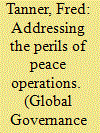

|
|
|
| 2 |
ID:
096191


|
|
|
| 3 |
ID:
096189
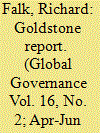

|
|
|
| 4 |
ID:
096185
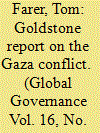

|
|
|
|
|
| Publication |
2010.
|
| Summary/Abstract |
By concluding that, in its assault on Gaza under the rubric of self-defense, Israel had targeted the civilian infrastructure and consciously "punished" the civilian population and demonstrated indifference to the suffering of noncombatants and engaged in other acts in violation of the laws of war, behaviors that possibly constituted in their totality crimes against humanity, the Goldstone Report became almost as controversial as the events precipitating it. In this agora, four eminent international lawyers, a mix of scholars and practitioners, assess from their distinctive perspectives the report's methodology, its compliance with fact-finding norms, and the overall quality of its effort to apply norms of international law to a bloody event in the ongoing multidecade conflict between Jews and Arabs over the governance and division of the former British-controlled Palestinian Mandate. Dialectically, they help to structure future debates over UN-sponsored fact-finding and also the normative parameters of the use of force by powerful states engaged in asymmetrical conflicts.
|
|
|
|
|
|
|
|
|
|
|
|
|
|
|
|
| 5 |
ID:
096194
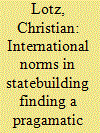

|
|
|
| 6 |
ID:
096202
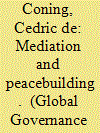

|
|
|
|
|
| Publication |
2010.
|
| Summary/Abstract |
This article focuses on the role of the special representative of the Secretary-General (SRSG) in the context of UN integrated missions. The article argues that the primary leadership function of the SRSG is to facilitate a process that generates and maintains strategic direction and operational coherence across the political, governance, development, economic, and security dimensions of a peacebuilding process. The power and influence of the SRSG does not reside in the resources that he or she can directly bring to bear on a specific situation, but in the ability to muster and align the resources of a large number of agencies, donors, and countries to support the peacebuilding effort in a given context. This type of leadership role implies that persons with skills, experience, and a personality suited to multistakeholder mediation and negotiations are more likely to be successful SRSGs than someone who is used to top-down, autocratic, military, private sector, or direct-control type leadership styles. This perspective on the role of the SRSG has important implications for the way in which people are chosen and prepared for these positions, as well as for the ways in which support can be provided for this role, both at the United Nations and in the field.
|
|
|
|
|
|
|
|
|
|
|
|
|
|
|
|
| 7 |
ID:
096198


|
|
|
|
|
| Publication |
2010.
|
| Summary/Abstract |
This article argues that mediation and political engagement by third parties can contribute to peacebuilding by strengthening the political processes in countries exiting civil conflict. Third-party engagement can create the political space within which long-term reconstruction, development, and reconciliation issues can be discussed among national actors. Given that peace agreements are frequently mere cease-fires representing short-term deals among elites, mediation and political engagement can assist the transformation of these deals into long-term commitments and inclusive national politics. Specifically, mediation can contribute to peacebuilding in three ways. First, mediators contribute to peacebuilding by working toward peace agreements that serve as frameworks for the opening up of the political process as opposed to agreements that lock in detailed, long-term governance models and concentrate power in the hands of the wartime elites. Second, in the period immediately following the signing of peace agreements, mediation helps parties adhere to the agreements and settle any remaining issues. Third, mediation contributes to making transitional governments workable and, as much as possible, ensures that they gradually lead to more inclusive political processes.
|
|
|
|
|
|
|
|
|
|
|
|
|
|
|
|
| 8 |
ID:
096200
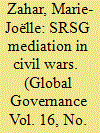

|
|
|
|
|
| Publication |
2010.
|
| Summary/Abstract |
In transitions from war to peace, mediators and other foreign interveners identify "spoilers" as one of the main threats to peace processes. Profiling would-be spoilers and developing appropriate typologies to prevent them from using violence has become prevailing wisdom at the United Nations and beyond. This article argues that the spoiler typology has limited utility as a tool to guide the action of mediators and help them devise winning strategies. It asserts that there are no fixed spoiler types; actors' propensity to use violence depends on conditions that affect their capability and their opportunity structure. It uses the twin notions of capability and opportunity to identify ripe situations for mediation and for peace implementation. It also utilizes these notions to reflect on the appropriateness of various strategies that the international community can use in its attempt to bring about peace to war-torn countries. The article suggests that it is not actors, but contexts, that need to be profiled. Furthermore, international custodians do not simply react to situations; they have a profound impact on shaping the opportunity structure of civil war actors, and their willingness to implement policies that increase the cost of violence goes a long way toward determining whether or not local actors will use violence.
|
|
|
|
|
|
|
|
|
|
|
|
|
|
|
|
| 9 |
ID:
096188


|
|
|
| 10 |
ID:
096187


|
|
|
|
|
|
|
|